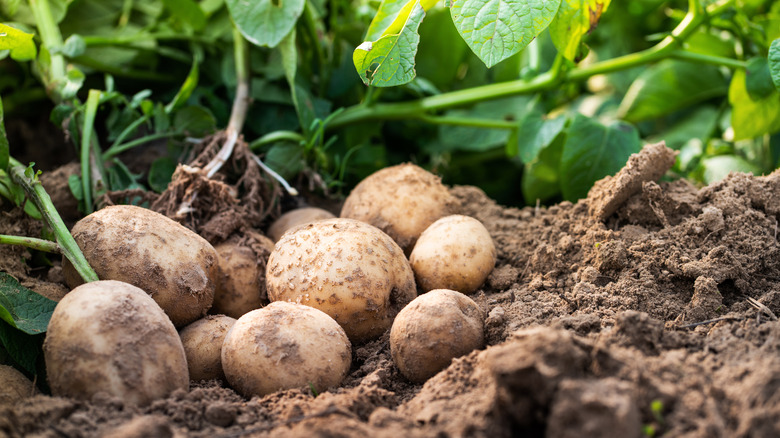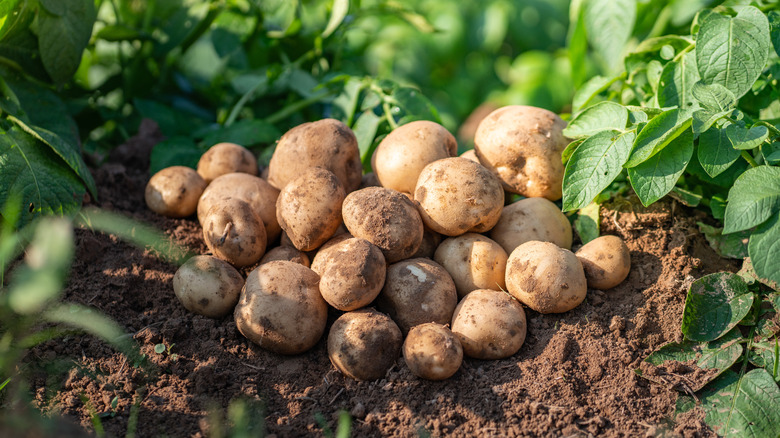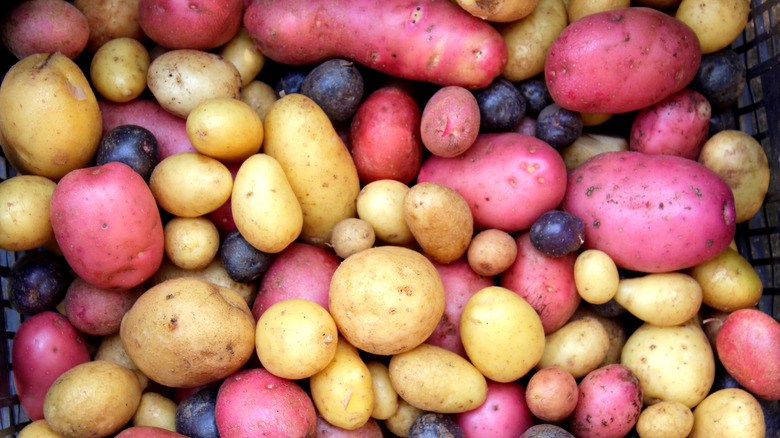The Odd Reason Potatoes Used To Be Illegal In France
Alongside pasta and rice, potatoes share the virtue of being a basic, versatile, must-have starch that can be used in a seemingly endless number of dishes, whether the spuds show up in a side dish such as potato gratin or potato salad or take a starring role in main dishes including potato-leek soup and Spanish tortilla patata. Seeing as how potatoes are consistently the top-consumed produce item in the United States (via USDA) and are beloved all over the world, it's hard to imagine a time in which the vegetable was mistrusted, reviled — and even outlawed.
But as history demonstrates, potatoes — which are native to the New World and which were introduced to Europe by Spanish conquistadors returning from the Andes (via Smithsonian) — were once looked upon with confusion and scorn. Introduced to Europe in the late 1500s and early 1600s, the crop was previously unknown overseas, and it took time before Europeans accepted them as edible and eventually embraced them (via Smithsonian). Read on to learn more about the complicated past of this now-staple veggie — and why France even outlawed the growing of the crop in the 1700s.
Banned as a disease-spreading vegetable
Starchy, creamy potatoes — the endlessly versatile vegetable that shines in dishes ranging from chips to fries to mash and more — wasn't always so beloved. According to the Los Angeles Times, when the crop was first brought over from the Incan Empire in the 1500s and 1600s, Europeans viewed it as evil for a number of reasons.
Some clergymen suggested God did not intend for potatoes to be eaten because the Bible did not acknowledge them, according to the Los Angeles Times. Botanists correctly identified spuds as belonging to the nightshade family of plants, which can contain a substantial amount of toxins that are inactivated by cooking, leading to a misguided link between potatoes and witchcraft or devil worship.
And finally, herbalists noticed a similarity between the way potatoes look and the appearance of the hands of those suffering from leprosy and wrongly believed potatoes could cause the disease, a chronic bacterial infection that was epidemic in Europe for many centuries and didn't start to decline until the 1600s (via International Leprosy Association).
The vindication of the potato
Ignorance and fear lead to the French Parliament banning the cultivation of the crop in 1748, a measure that was maintained until 1772 after French army medical officer Antoine-Augustin Parmentier, who had been captured as a prisoner of war by the Prussians during the Seven Years War, was fed a steady diet of potatoes during his imprisonment and found them to be harmless — and even tasty (via The Connexion). Parmentier promoted the consumption of the spuds to the era's reigning monarch, King Louis XVI, and in 1772 the ban on growing potatoes was overturned.
Though it still took some time for the French and other Europeans overall to start to love the humble tubers, they were eventually won over (via The Connexion). Parmentier's efforts as a potato hype man were commemorated with a number of dishes, such as the shepherd's pie-like, mashed potato-topped hachis Parmentier (via France Today). Vive la pomme de terre!


